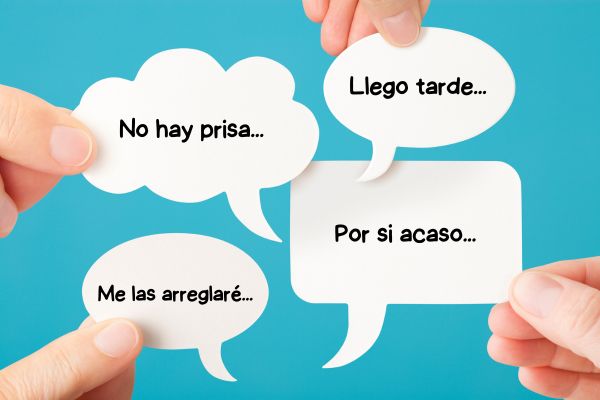The most useful phrases for your daily conversations in Spanish are what Spanish teachers call “chunks.”
These are words that we always use together and that have a specific meaning when we use them in our conversations or write them in our texts.
Many of my students reach a level of Spanish where their grammar is quite good and their vocabulary is varied and abundant enough to achieve results on level tests that would place them at the upper intermediate or even advanced level.
However, to get that extra point that gives your Spanish the necessary fluency and makes you feel like you are really speaking like a native, you need to start using and integrating the most useful phrases for your daily conversations in Spanish and that’s what we are going to see in this article. And also, so you can compare with a language like English and see how colloquial and common the most useful phrases for your daily conversations in Spanish that I have selected for this article are, let’s look at these expressions in Spanish and English.

We begin the list of the most useful phrases for your daily conversations in Spanish with three phrases that I myself have used this week in my conversations via email, WhatsApp or video call with my students or friends.
Examples:
Estoy muy entusiasmada con la idea de organizar un viaje lingüístico-cultural para mis estudiantes.
I’m excited about the idea of organising a linguistic-cultural trip for my students.
***
David está entusiasmado con el embarazo de su hermana.
David is excited about his sister’s pregnancy.
Examples:
Me gustaría mucho ir de vacaciones con vosotros, pero vais dos parejas. Si fuese otra amiga soltera como yo, iría. ¿Me entiendes?
I would really like to go on holiday with you, but you are two couples. If there was another single friend, I would go. Does that make sense?
***
Si lo único que haces es trabajar y no descansas, tu salud se va a deteriorar y entonces, no vas a poder seguir trabajando. ¿Tiene sentido lo que estoy diciendo?
If all you do is work and you don’t rest, your health will deteriorate and then you won’t be able to continue working. Does that make sense?
Examples:
Aunque sabía que no vendrías a la boda, te envié la invitación por si acaso.
Even though I knew you wouldn’t come to the wedding, I sent you the invitation just in case.
***
No sé si mis sobrinos van a venir a cenar, pero voy a preparar una pizza más por si acaso.
I don’t know if my nephews are coming to dinner, but I’m going to make an extra pizza just in case.

We continue this list of the most useful phrases for your daily conversations in Spanish with four phrases that I wish I had known in English when I was living in the United States and Canada, because they are super useful.
Examples:
Lo siento, llego tarde. Estaba muy concentrada escribiendo un artículo para mi blog y no vi la hora.
Sorry I’m late. I was really focused on writing an article for my blog and I didn’t see the time.
***
Susana, estoy en un atasco, voy a llegar tarde.
Susana, I’m stuck in a traffic jam, I’m going to be late.
Examples:
(In Spanish class, conversation between the teacher and a student)
Tienes que escribir tres ejemplos usando las preposiciones “por” y “para”. Tómate tu tiempo para pensar, no hay prisa.
You have to write three examples using the prepositions “por” and “para”. Take your time to think, there is no hurry.
***
(At the end of a job interview, conversation between the interviewer and the candidate)
Entrevistador: Me han gustado mucho tus respuestas en la entrevista y tu currículum. Antes de tomar la decisión final, necesito analizar tu perfil.
Candidato: Sí, por supuesto, no hay problema. Tómese su tiempo para hacer el análisis de mi perfil y espero su respuesta.
Interviewer: I really liked your answers in the interview and your CV. Before making the final decision, I need to analyse your profile.
Candidate: Yes, of course, no problem. Please take your time to analyse my profile and I look forward to hearing from you.
Examples:
Este año quiero pasar un fin de semana en la playa con mis amigas de la universidad en verano. Solo es enero, pero voy a empezar a organizar las cosas sin prisa.
This year I want to spend a weekend at the beach with my friends from university in the summer. It’s only January, but I’m going to start planning things without rushing.
***
Examples:
Son casi las diez… ¡Date prisa! La película va a empezar.
It’s almost ten o’clock… Hurry up! The movie is about to start.
***
Dani, date prisa o vas a perder el autobús para ir al cole.
Dani, hurry up or you’ll miss the bus to school.

We finish this list of the most useful phrases for your daily conversations in Spanish with three phrases that I use a lot when I talk to my great friend Jeevi, from Singapore, another entrepreneur who also works a lot like me 😂
Examples:
He estado trabajando tres semanas sin parar preparando el viaje lingüístico-cultural para mis estudiantes en España.
I have been working non-stop for three weeks preparing the linguistic-cultural trip for my students in Spain.
***
Jeevi trabaja sin descanso estos días organizando su evento anual de danza africana en Singapur.
Jeevi is working non-stop these days organising her annual African dance event in Singapore.
***
Mi hermana entrenó sin respiro el mes pasado para la maratón.
My sister trained non-stop for the marathon last month.
Examples:
Mi hija estudia por las mañanas y hace prácticas por las tardes. El próximo mes quiere empezar a trabajar también los fines de semana. Yo creo que es demasiado pero, ella dice que se las arreglará.
My daughter studies in the mornings and does practical work in the afternoons. Next month she wants to start working on weekends too. I think it’s too much, but she says she’ll figure it out.
***
El próximo año quiero hacer dos viajes lingüístico-culturales con mis estudiantes en España, quiero encontrar más estudiantes para mis clases individuales online y quizá voy al Reino Unido en verano a dar un curso de español. ¡Es mucho trabajo! Pero me las ingeniaré.
Next year I want to go on two language-cultural trips with my students in Spain, I want to find more students for my online individual classes and I might go to the UK in the summer to give a Spanish course. It’s a lot of work! But I’ll figure it out.
Examples:
No he tenido vacaciones en tres años porque he estado trabajando en mi nuevo negocio y ahora que las cosas van bien, necesito tomarme un descanso.
I haven’t had a vacation in three years because I’ve been working on my new business and now that things are going well, I need to take a break.
***
María, has estado trabajando todo el día en tu proyecto fin de máster. Tómate un respiro y vamos a dar un paseo.
Maria, you’ve been working all day on your master’s thesis. Take a break and let’s go for a walk.

The first thing is to memorise the most useful phrases for your daily conversations in Spanish that you have seen in this article, understand the examples and write new examples using these phrases to practise.
The second thing is to practice your pronunciation. Repeat these phrases out loud over and over again, and read the examples in the article out loud several times.
Now you are ready to start using them in your daily conversations in Spanish.
There are many ways to practise conversation these days, doing online exchanges with Spanish speakers who are interested in learning your native language is one option.
Here I suggest our 30-minute conversation classes, where you will practice different aspects of your conversation with a native teacher (from Spain), that is accredited and experienced: free conversation, telling stories, doing an interview, making a presentation, explaining your personal opinion on a current topic, practising a bit of debate…
Your teacher will help you improve your pronunciation, correct your mistakes and give you tips to improve your fluency and speak like a native.
Also, remember that at Your Spanish Hub, with your class packs, you have unlimited and free access to all the video lessons and self-correcting activities in our Membership Programme. Book your trial class with us and ¡vamos a hablar!
